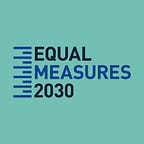EM2030 and partners present the SDG Gender Index in Senegal
In Senegal, many girls face challenges in completing their education due to child marriage, early pregnancy and gender-based violence. High levels of poverty, low levels of social protection and discriminatory family laws, such as ownership of assets and inheritance, further implicates gender equality in the country.
Two of Equal Measures 2030’s (EM2030) national partners in Senegal — Plan International Senegal and ONE Campaign — used the International Day of the Girl (IDG) on 11 October as an opportunity to invite hundreds of girls and young women, civil society organizations and government representatives for an event focusing on the specific context for girls and women in their country.
The IDG (or JIF — la Journée Internationale de la Fille — as it is known Senegal) event took place in 80km down the coast from Dakar in Mbour, a choice motivated by the desire of many girl advocates to engage young people outside of the capital.
What is more, the high rates of sexual and gender-based violence in the region provided a pertinent backdrop to the theme of this year’s event: Safe Spaces for Girls.
From speeches to theatre sketches to performances by Senegalese hip hop artist Black Queen, the day saw a huge variety of acts and activities that drew together everyone from the grassroots to the highest echelons of government in one conversation.
Importantly, this event also provided a crucial opportunity to present Equal Measures 2030’s National Briefing on Senegal. Developed in partnership with ONE Campaign, this report takes the scores of the EM2030 SDG Gender Index for Senegal and contextualises the findings in an analysis of the policy environment and the situation for women and girls across the country.
“The work of Equal Measures 2030 and its tool, the SDG Gender Index, represent an opportunity to make significant progress towards the achievement of gender equality, from now until 2030,” said Plan Senegal’s Country Director Amelie Soukossi Hessou in her speech.
While Senegal has the highest rate of poverty among EM2030’s focus countries, it has seen great progress on many of the Index’s other gender equality indicators. For example, the country has made legal advances to ensure women’s equality with the 2010 Parity Law. The law amends the Constitution to mandate parity between men and women in electoral lists for all elections. In 2018, 42% of the seats in Senegal’s National Parliament were held by women.
However, the report notes how political will has not always translated into tangible impact for girls and women: the country continues to face challenges such as high female illiteracy, poor secondary school achievement among girls and continuing harmful traditional practices such as Female Genital Mutilation and Child, Early and Forced Marriage.
Events like the one in Mbour remind us of the drive and commitment of gender equality advocates in Senegal, the great work that is being done by civil society organizations and the opportunities to engage policymakers in meaningful action.
However, as the EM2030 National Briefing on Senegal notes, transformative change will only be possible when this action is demand-driven, engages women’s rights movements and rooted in robust data and evidence.
Read more about gender equality progress in Senegal on the Gender Advocates Data Hub.
